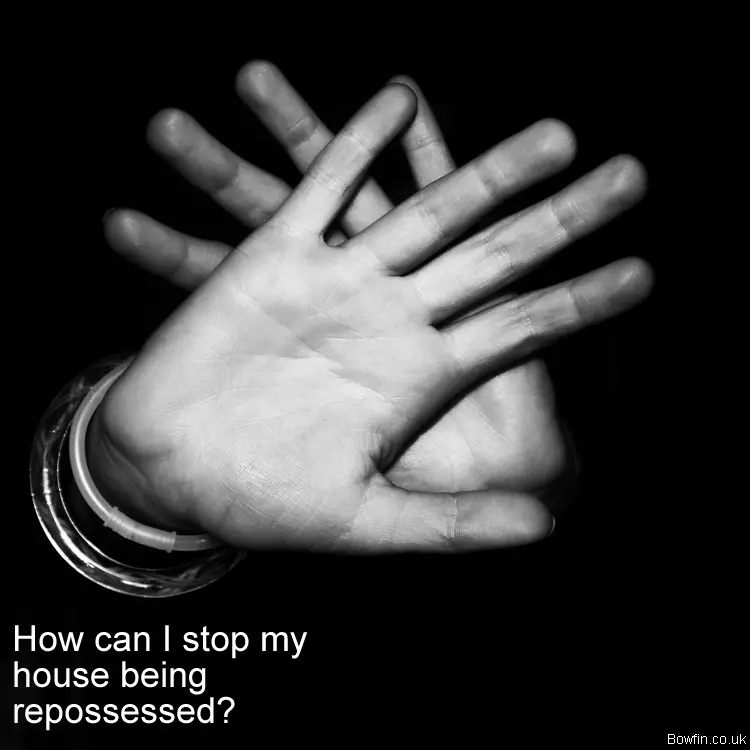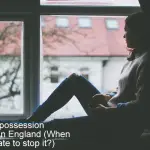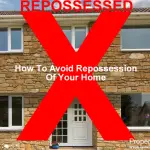
If you are behind on your mortgage payments and if you’ve received a repossession letter, you can still stop your house from being repossessed. But you cannot waste any time and you need to act fast. Don’t stick your head in the sand!
7 key steps of how can you stop your house being repossessed:
- Talk to your lender.
- Write to your lender to ask for revised mortgage terms.
- Make a plan to pay something towards your mortgage arrears.
- Seek expert repossession advice.
- Check if you’re eligible to receive help with your mortgage payments.
- Are you eligible to claim benefits.
- Sell your house quickly.
An additional 5 steps of how to stop your house being repossessed:
- Check your insurance cover.
- Change your mortgage lender.
- Ask your family for help.
- Get a lodger or perhaps use Airbnb or use spareroom.
- Get a part-time job or side income.
But let’s now take a look at how you can stop your house from being repossessed and each of these solutions in more detail.
1. Talk to your lender
In respect of arrears on a residential property, all lenders have to follow pre-action protocol rules. This means they cannot simply issue court proceedings. They can only take you to court to repossess your home as a last resort.
The aims of this Protocol are to:
(a) ensure that a lender or home purchase plan provider (in this Protocol collectively referred to as ‘the lender’) and a borrower or home purchase plan customer (in this Protocol collectively referred to as ‘the borrower’) act fairly and reasonably with each other in resolving any matter concerning mortgage or home purchase plan arrears;
(b) encourage greater pre-action contact between the lender and the borrower in order to seek agreement between the parties, and where agreement cannot be reached, to enable efficient use of the court’s time and resources; and
(c) encourage lenders to check who is in occupation of the property before issuing proceedings.
Pre-Action Protocol for Possession Claims – Ministry of Justice UK
This is why you should take every opportunity to talk to and communicate with your mortgage lender. You should be able to talk to your lender at any stage of the mortgage repossession process.
Begin by taking a look at your finances. Work out what you can afford and see what arrangements you can make with your mortgage lender.
This leads on to the next solution. Which is to ask your mortgage lender to change your mortgage terms.
2. Write to your lender to ask for revised mortgage terms
There are a number of ways in which you can change your mortgage terms to help you afford your mortgage.
These include the following options:
- Ask for a repayment holiday. This means you take a break from paying your monthly mortgage payments. Interest will continue to accrue on your mortgage, but you’ll have a breather from making payments. This solution is particularly helpful if you’ve been made redundant or similar.
- Ask for the arrears to be added to the end of your mortgage. This is what’s also referred to as capitalising your payments. By doing this you’re no longer in arrears. You’ll still have to pay the arrears as a part of your total mortgage, but not right now.
- Change your mortgage type or rate. Speak with your lender to see if there are other mortgage products that would better suit your personal financial situation. This could have the affect of reducing your monthly mortgage payments.
- Extend the term of your mortgage. All mortgages have a set term, which is often 25 years. If you extend this term you could reduce the amount you pay on a monthly basis. This may be enough to alleviate the financial stress you have right now. It may allow you to be able to once more afford your mortgage.
You can talk to your mortgage lender about your arrears at any stage in the repossession process. This is even where legal action has begun.
Your aim is be able to come to an arrangement that avoids your house from being repossessed. Plus it will allow you to keep your home.
More Reading: How To Avoid Repossession Of Your Home
3. Make a plan to pay something towards your mortgage arrears
Making an effort to pay at least something towards your mortgage shows you are trying your best.
Whilst you will remain in arrears and this will already have impacted on your credit status, it shows willing and indicates to your mortgage lender how you’re prioritising these payments over other personal costs.
More Reading: How long does a house repossession stay on your credit report?
4. Seek expert repossession advice
If you’re finding the whole repossession situation stressful, and if you need help, you should seek expert repossession advice.
The following contacts can provide help and advice:
- The National Debt Line – National Debt Line are a national charity for people with debt problems.
- Citizens Advice – Citizens advice have trained advisers online.
- StepChange Debt Charity – StepChange offer the widest range of debt solutions, to help you no matter what you’re dealing with.
5. Check if you’re eligible to receive help with your mortgage payments
There is help available for mortgage payments, but these only help towards the interest element of your mortgage payments, not the capital. But this may be enough to allow you to afford the total mortgage payment.
But also, if you speak with your lender, as discussed in solution ‘1 through 3’ above, you may be able to reduce what you pay to your mortgage lender. This could reduced to the interest only element of your mortgage payments, until such time as you are able to afford the full mortgage payment.
Where you can get support for mortgage payments includes the following sources:
- Support for mortgage interest payments (SMI) – SMI is paid to you as a loan, which you’ll need to repay with interest when you sell or transfer ownership of your home.
- Housing costs and Universal Credit – You can get help paying for your housing if you’re eligible for Universal Credit.
To receive help paying mortgage interest you’ll usually have to wait 39 weeks after your claim, before you receive the benefit. But if you’re eligible to receive pension credit, you can usually receive help right away.
As a part of your communication with your mortgage lender, you should tell them if you’ve applied for Support for Mortgage Interest or Universal Credit.
As a part of the pre-action protocol rules, your mortgage lender should hold back on commencing the repossession process, where your claim for this support is likely to be successful.
Also, subject to what you can agree with your lender in terms of reduced mortgage payments or repayment holidays etc., you’ll need to demonstrate to your lender you can make up for any shortfall the benefits or SMI don’t cover.
6. Are you eligible to claim benefits and prevent repossession
In addition to getting help with your mortgage payments, as explained above, you may also be eligible for certain benefits. Where you are unemployed and perhaps been made redundant, or perhaps you can’t work due to ill health, you may be able to claim benefits.
For more information, take a look at the Governments Benefits Calculator.
7. Sell your house quickly to avoid repossession
If you’ve read all of the above solutions, and for whatever reason none of them either suit your personal circumstances or don’t apply to you, please contact us to see if we can help with your specific situation.
More Reading: How long does it take for a property to be repossessed?
We have a number of fast solutions to help you to stop your house from being repossessed.
8. Check your insurance cover
If you have taken out insurance cover to protect you in the event of an accident, an illness or for redundancy, you may be lucky and discover that your mortgage payments are protected.
This is called Mortgage Payment Protection Insurance (MPPI), which is designed to protect your income and could help you pay your monthly mortgage payments.
Check to see if you have this type of cover, as this may help you stop your home from being repossessed.
9. Change your mortgage lender
It’ll not be easy to change mortgage providers if you are already in arrears, as this will have already affected your credit report and your ability to borrow.
More Reading: If my house is repossessed can I get another mortgage?
Having said that, it may be worth speaking with a mortgage broker to see if you are able to borrow from a different lender. The benefit of doing this might be to reduce your monthly payments to a more affordable amount.
But the reality is, you are far better off approaching other mortgage lenders before you go into arrears. But before you make any changes of this sort make sure you seek independent financial advice first.
More Reading: Does one late mortgage payment affect credit score?
10. Ask your family for help
If you have a close family with others in the family who may be able to help, it might be good to open up to them about your financial problems.
This help may come in many forms, such as moving in with a family member until you’ve got through the worst, borrowing from a family member enough money to afford the mortgage repayments, or other ideas that may come up from discussing the impending repossession.
However, where help is sought from a family member, and especially if this is in the form of a loan, it’s a good idea to get things in writing. The last thing you want to happen is to fall out over something like this.
Also, be sure to be totally upfront and honest with your family. Don’t make promises you can’t keep. A broken promise is the fastest way to a family bust-up.
If the option of moving in with in with a family member is available to you, you could opt to rent your property out to cover the mortgage payments. But before you let your house to tenants, make sure you have the agreement of your mortgage lender to do so.
More Reading: What are the tax implications of buying a house before selling?
11. Get a lodger or perhaps use Airbnb or use spareroom
If you have a spare room in your house, you could use this to get extra income to help you cover the mortgage payments. These are your options to rent a room:
- Spareroom.co.uk – an easy way to find people looking to rent a spare room.
- Airbnb.co.uk – this a great way to make some extra cash from a spare room in your house, no matter where you live in the UK.
- Roomclub.com – This is used for people to find a spare room across the UK and London.
- Your local letting agent – you can use the services of a local letting agent to help you let a spare room.
- Facebook – Facebook is a great way to find all kinds of things, including a roommate.
However, if you are going to get a lodger to rent a spare room in your house, make sure you either vet them or use one of the above services to find someone.
More Reading: What to do if you bought a house you can’t afford
If you live near to one of the UK’s busy airports, you may be able to let to air crew, which includes pilots and cabin crew. Air Crew Accommodation is a site dedicated to finding air crew accommodation.
The good thing about letting a room in your house is you’ll get up to £7,500 tax free by renting a room out.
12. Get a part-time job or side income
If you’re struggling to pay your mortgage, which is perhaps due a shortfall in your income, getting a second income is a possible solution.
A second income could come in the form of a another part time job or from side business or ‘side-gig‘. Not that it’s that easy to start an online business, this is a great option to look into for sure. Blogging is a great way to make some extra income from affiliate income.
Alternatively, you could look into moving jobs completely from what you are doing right now. See if you can find a job that pays better money. This may be enough for you to be able to afford your monthly mortgage payments.
What happens if a property is repossessed?
If your house is repossessed, your bank will sell it at under market value. Many times a repossessed house is sold at auction, as this is a quick way for your mortgage lender to realise what you owe. This can be as low as 75% of its fair market value.
If these sale proceeds create a shortfall between what your mortgage lender receives and what is owed on your mortgage, you may be asked to pay this shortfall.
Your mortgage lender will deduct any costs or legal fees from the proceeds they receive for selling it. If the sale proceeds, after deducting sale costs and repossession costs, exceed what you owe on your mortgage, these proceeds will be paid to you.
To be clear though, let’s explain exactly what happens in a repossession.
Repossession meaning and what happens in a repossession
The meaning of repossession is where a bank or mortgage lender takes possession of a house where there’s a loan or mortgage secured on it.
A repossession is what happens if you stop making loan or mortgage payments. This means you go into what’s referred to as mortgage arrears. If you don’t make good those arrears or if you fail to communicate with your mortgage lender, the repossession process begins.
More Reading: What is the process of house repossession?
Once your house is repossessed, it’s usually sold by auction. It’s common practice for repossessed houses to sell at auctions for a fraction of their fair market value.
If your house sells for less than your outstanding mortgage or other loans secured on your home, you will owe the lender(s) the difference. This is called the “deficiency balance”. But on the other hand, if any money is left over after your loans have been repaid, repossession costs and legal fees, you’ll receive the balance.
More Reading:
How many missed payments before house repossession?
I hope you’ve got something from reading this article on how can I stop my house being repossessed
If you’ve got something from this article on how can I stop my house being repossessed please share it on your favourite social media site.
Also, if you have any questions, please feel free to comment below too. Alternatively, if you need more help, please feel free to contact us on our contact us page here. Or join the discussion and ask your question in the property forum.




